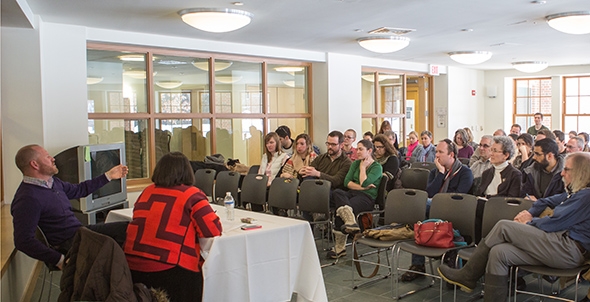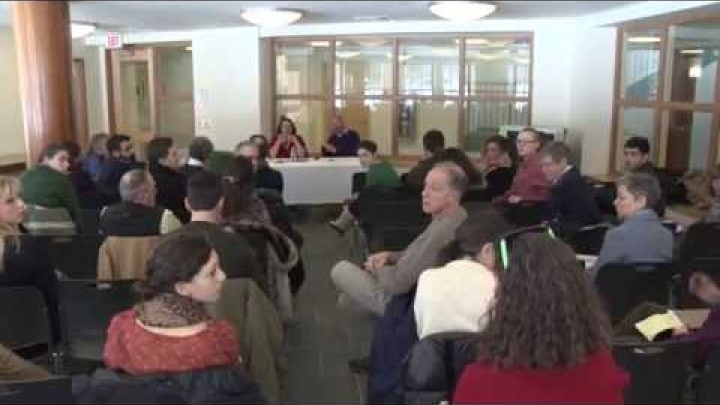The mission of enhancing campus housing options must be fundamentally linked to Dartmouth’s academic mission, said Mike Wooten, director of residential education, at the second session of “Moving Dartmouth Forward.”

“Knowledge is co-creative,” Wooten said. How, he asked, can Dartmouth enable the community ties students develop in their first-year experience to carry through their academic, residential, and creative careers at the College?
Wooten and Inge-Lise Ameer, senior associate dean of the College, hosted the second in the series, which is designed to give community members an opportunity to discuss ideas related to President Phil Hanlon ’77’s initiatives and to generate new ideas.
Read more:About 80 people took part in the lunchtime conversation a video of which is below. A second session took place in the evening.
Much of the discussion centered on ways to build community and create spaces where students can share meals, study, work on creative projects, and make connections with people of different backgrounds and outlooks.
“Design is huge,” said Lorie Loeb, a research professor in computer science and a co-founder of the Digital Arts Leadership and Innovation (DALI) Lab. Communal spaces, central bathrooms, and creative work spaces that draw people out of their corners are catalysts for students to come together to generate their own solutions to creating community, she said.
Ameer pointed to the new Triangle House for the College’s LGBTQIA students. The idea is that this affinity house will also develop as an artistic and learning community that will offer events, lectures, and artistic experimentation that will draw from and enrich the wider Dartmouth community.
Assistant Professor Ryan Hickox of the physics and astronomy department talked about creating more informal spaces for faculty and students to interact. He suggested faculty could be affiliated with residences or learning communities much like the residence hall system at Harvard and Yale.
A fundamental step in developing residential living that includes a “right to return” to a residential home base throughout an undergraduate’s college career is expanding the current housing stock at the College, Ameer acknowledged. She said the committee is making an inventory of living space at Dartmouth, to be forwarded to Hanlon within six months. The president’s office will use the inventory in developing a plan for growth.
Wooten also outlined some first steps the residential education office has taken in developing Hanlon’s vision for “learning communities.”
Three pilot programs are slated to welcome students this fall. A “Global Village” will bring students together in a residential cluster focused around international issues. There will be an entrepreneurial learning community built around the new Student Innovation Center. And the College has invited undergraduates to design their own community with an added creative, academic, visionary focus, Wooten said.
The “Moving Dartmouth Forward group focused on enhancing housing options will continue to solicit comments and suggestions from faculty, staff, students, and alumni. The issue has a space on the Improve Dartmouth website, which allows community members to log in with a Dartmouth ID to join the discussion.
The Moving Dartmouth Forward” conversations will continue into the spring. All dialogues will take place from 12-1 p.m., and again from 6:30-7:30 p.m. Below is the current schedule of sessions, with presenters for each listed. Other topics will be added to the schedule as details become available.
- March 3: Creative use of new learning technologies Location: 12-1 p.m. session, Alumni Hall; 6:30-7:30 p.m. session, Fahey ground floor Presenters: Josh Kim, director of digital learning initiatives Allan Cattier, director of academic and campus technology services
- April 28: Arts and Innovation Location: TBA Presenters: Trip Davis, executive director of the Office of Entrepreneurship & Technology Transfer Adrian Randolph, associate dean of the faculty for the arts and humanities
- May 12: Global Learning Experiences Location: TBA Presenters: Lynn Higgins, associate dean of the faculty for international and interdisciplinary studies Lindsay Whaley, associate provost for international initiatives
